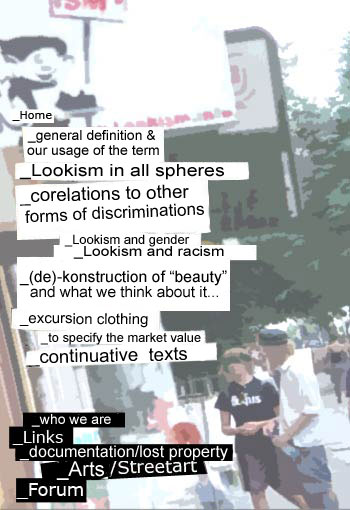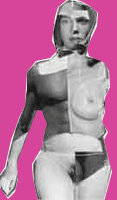
(De-)Construction of the sense of beauty and our thoughts on it..
Our criticism of lookism is based on the conviction that one's sense of beauty is constructed as well as an outcome of socialization. Yet we do not want to attempt to attack the notion that certain objects or landscapes are beautiful/ugly for instance. In our opinion the sense of beauty starts getting problematic as soon as it is applied to individuals.
There is a scientific attempt which aims to explain beauty norms on a biological level. This so-called biological determinism proposes that the sense of beauty is "inborn"(*1).
Driven by ancient instincts everyone is supposed to be constantly looking for the most attractive partner with the best genetic material.
Thence, the preference of "good-looking" people is perceived as an effect of their superior genes. We regard this argumentation, which is based on a darwinist concept of evolution, as very problematic for various reasons. This argumentation is heterosexist(*2) for instance, since it presumes a heterosexual desire only(*3). Furhermore, we think that the assumption that the sense of beauty is not an outcome of socialization, is easily refutable.
The socially accepted beauty ideal varies according to culture, time and social surrounding. For example, in former times more corpulent women were perceived as "more beautiful" and small feet were regarded as the embodiment of female "beauty" and eroticism until the 20th century( the young girl's feet were "tied" tightly and their toes were broken).
The perception of tanned skin as "beautiful" is affected culturally and historically as well.
The sense of beauty is neither innate nor "natural" nor completely indiviualistic. Moreover, it is always influenced by social norms(*4). Therefore we think that even though many people may propose that their sense of beauty is "totally individualistic", their sense of beauty matches with the societal beauty ideal or the beauty ideal which is common in a certain scene, in most points.
And "beauty" cannot be thought of without "ugliness". ´This inevitably leads to hierarchization of individuals. Furthermore, the "beautiful-ugly"-value system is often applied to one's self. This leads to a judgment of one's own body, which is often entailed by feelings of inferiority(*5) and eating disorders(*6).

There is a slogan that goes "love your body the way it is", which can even be found in so-called "women's magazines". On the other hand these magazines depict bodies that fit into the norm and they emphasize the importance of ones's outward appearance. How can the acceptance of your own body work out as long as there are societal/in-group norms which define the categories "beautiful" and "ugly"?
Nevertheless, we do not strive to create a sense of beauty which is "more individualistic"(*7). On the contrary we want to abandon classifications of bodies as "beautiful" and "ugly" completely.
Yet, this does not mean that no one is supposed to regard anyone as nice/sexy/great anymore. We think that there are enough other possibilities and reasons for liking yourself and others ( what he_she says and does)(*8). But this change of mind has to be a process since we are being trained to judge our bodies since we were little.
Thence, we do not propose statements like: "He_she looks ugly but...". When judging others one's sex/gender and skin color should be of no relevance. As well as an individual should not be (de)valued because of certain bodlily forms/characteristics.
__________________________________________________
1 Sex/gender is naturalized with similar arguments. The sex/gender order and sex/gender roles are pictured as “natural” and thus legitimized biologically.
2 Heterosexism is the thinking and behavior which rates heterosexuality as “normal” as well as superior to other forms of sexual orientation.
3 Inherent the theory of the waist-hip-relation and female “attractiveness”: “Men have learned, throughout evolution, to recognize a woman’s biological fitness intuitively, for instance by means of the waist-hip-relation. In the ideal case it is in the range of 0,7 and it has always stayed the same independent of fashion and body ideals.” http://www.3sat.de/3sat.php
4 Social beauty norms always serve as a safeguarding of power relations. This is also recognizable because beauty ideals are coined by patriarchy (outward “beauty” is regarded as more important for women) and racism (the white, western beauty ideal is dominant worldwide).
5 These inferiority feelings have a negative effect on one’s self-confidence. Thus people who are/were rated as “ugly” or feel “ugly” often seem even more “unattractive”- because a lack of self-confidence is often perceived as “unattractive” (whereas a strong self-confidence is perceived as “nubile/attractive”).
6 Even if a person is classified as “good-looking” according to the dominant norm he_she has to maintain his_her value (which means: stay “good-looking”) respectively he_she has to fear the loss of this value (through aging, the finishing of a diet etc.). Although he_she is privileged it is possible that he_she is reduced to his_her outward appearance. She_he underlies social norms and the pressure to fit into these norms.
7 We also think that total individualization impossible ( and even if so, who should set the standard?). If a “change of mind” takes places, we can leave that behind completely.
8 Respectively there still enough reasons to dislike people (on the basis of their behavior)…